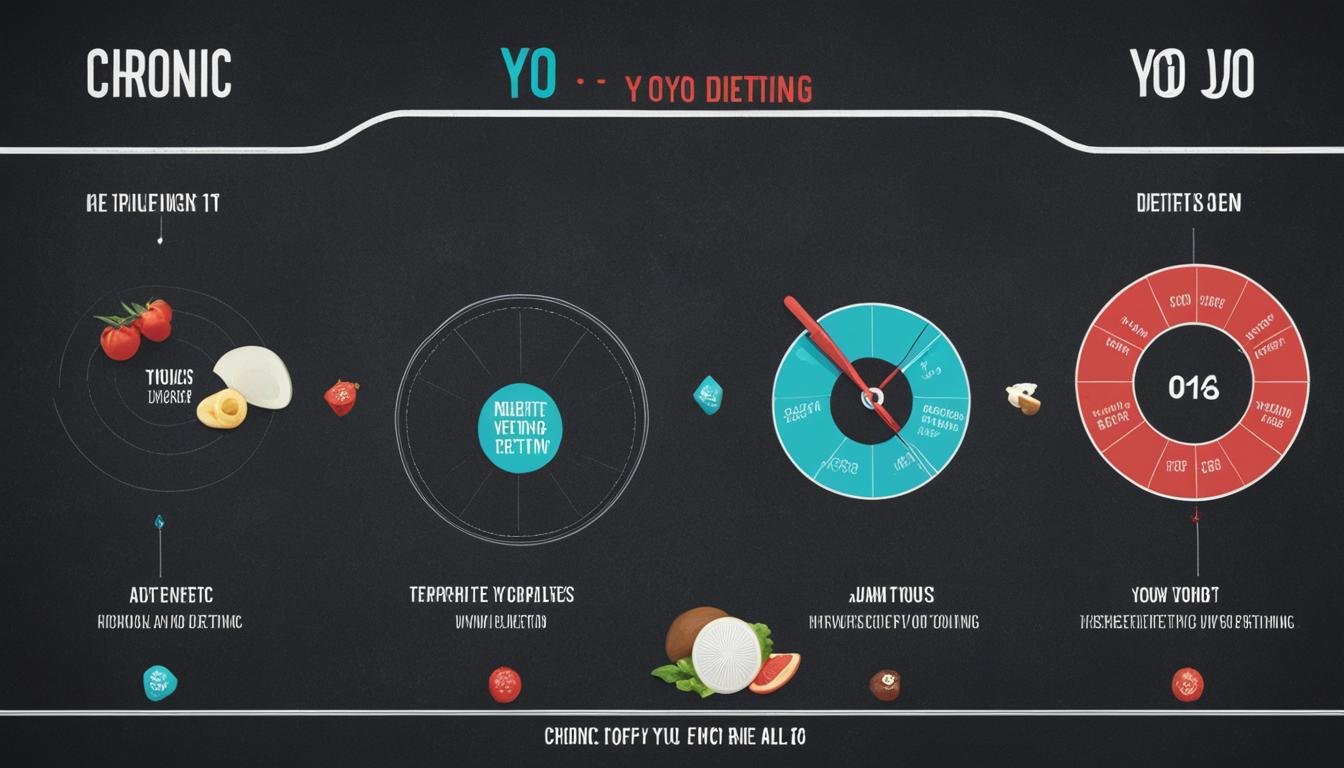When it comes to weight management, two common approaches often come to mind: yo-yo dieting and chronic dieting. But how are they different? And what impact do they have on our health?
Yo-yo dieting is characterized by the repetitive cycle of weight loss, weight regain, and weight loss again. This pattern often occurs as a result of following fad diets that promise quick results but fail to provide long-term sustainable solutions. On the other hand, chronic dieting refers to the practice of consistently maintaining a restrictive eating pattern to achieve and maintain a specific body weight.
Understanding the differences between these two approaches is crucial for achieving sustainable weight management and overall well-being. From their impact on metabolism to their psychological effects, let’s dive deeper into the distinctions between yo-yo dieting and chronic dieting.
Key Takeaways:
- Yo-yo dieting involves a cycle of weight loss, weight regain, and weight loss again, while chronic dieting focuses on maintaining a specific body weight through restrictive eating patterns.
- Yo-yo dieting often results from following fad diets, whereas chronic dieting involves long-term lifestyle changes.
- Yo-yo dieting can have negative effects on metabolism, muscle mass, and overall well-being, while chronic dieting promotes sustainable weight management.
- Understanding the distinctions between yo-yo and chronic dieting is essential for making informed choices regarding weight management and long-term health.
The Distinction Between Yo-Yo and Chronic Dieting
The key distinction between yo-yo and chronic dieting lies in the approach, reason, and process. Chronic dieting is a lifestyle practice that involves regulated food choices to achieve and maintain a specific body weight or physiological features. On the other hand, yo-yo dieting involves the strict manipulation of food or specific types of food to achieve weight loss.
Yo-yo dieting is commonly associated with fad diets that offer short-term weight loss results but fail to address long-term sustainable lifestyle changes. These diets often focus on strict limitations and restrictions, offering quick fixes rather than promoting overall health and well-being. In contrast, chronic dieting emphasizes creating sustainable habits and addressing food behaviors to maintain weight loss for an extended period of time.
By adopting a chronic dieting approach, individuals can develop long-term healthy eating habits and a sustainable lifestyle. This entails making regulated food choices based on nutritional needs and personal preferences, rather than strictly following temporary and restrictive diet plans. Chronic dieting provides a foundation for lasting weight loss and promotes a positive relationship with food, facilitating overall physical and mental well-being.
Key Differences Between Yo-Yo and Chronic Dieting:
| Yo-Yo Dieting | Chronic Dieting |
|---|---|
| Strict manipulation of food choices | Regulated food choices based on nutritional needs and preferences |
| Focuses on short-term weight loss results | Emphasizes long-term sustainable lifestyle changes |
| Associated with fad diets | Promotes a positive relationship with food and overall well-being |
By understanding the distinction between yo-yo and chronic dieting, individuals can make informed choices about their approach to weight loss and overall health. Choosing a chronic dieting approach that focuses on long-term sustainable lifestyle changes and regulated food choices can lead to lasting weight loss and improve overall well-being.
The Phenomenon of Yo-Yo Dieting

The yo-yo effect, a phenomenon commonly observed among individuals who follow fad diets, refers to the repetitive cycle of weight loss, weight regain, and weight loss again. Fad diets often promise rapid weight loss through unhealthy means, resulting in short-term results. However, once the original diet is discontinued, weight regain occurs, highlighting the failure of these diets to create lasting changes in habits and lifestyle choices.
Yo-yo dieting lacks the long-term influence necessary to maintain weight loss and address underlying food behaviors. It is characterized by a cycle of temporary success followed by disappointment, as individuals find themselves trapped in an ongoing struggle with fluctuating body weight.
“Yo-yo dieting disrupts the body’s natural balance and rhythm, leading to metabolic confusion and an unhealthy relationship with food,” says Dr. Jane Thompson, a renowned nutrition expert. “Instead of focusing on quick fixes or fad diets, individuals should prioritize habit change and sustainable lifestyle modifications.”
Breaking free from the yo-yo dieting cycle requires a shift in mindset. Rather than seeking short-term weight loss through restrictive diets, adopting long-term expectations and prioritizing habit change is essential. Developing sustainable eating habits, incorporating regular physical activity, and embracing a balanced approach to nutrition are key factors in achieving and maintaining a healthy weight.
Putting an end to the yo-yo dieting cycle not only benefits physical health but also promotes mental well-being. By fostering a positive relationship with food and nurturing healthy habits, individuals can experience long-term success in their weight management journey.
Developing a healthy and sustainable approach to weight management involves addressing the underlying reasons for weight gain and implementing positive changes that promote lasting results. By focusing on long-term habits rather than quick fixes, individuals can break free from the yo-yo dieting cycle and achieve optimal health and well-being.
Yo-Yo Dieting in Athletes
While yo-yo dieting is commonly associated with fad diet users, it can also be observed in athletes, albeit with some key differences. Athletes often engage in weight cycling, which involves intentional weight changes based on their competition calendar or training goals. However, the approach, reason, and process of weight cycling in athletes differ from traditional yo-yo dieting. Athletes make small, calculated changes to their food choices to enhance performance, focusing on factors such as protein intake and timing. The weight regain in athletes is typically controlled and aimed at facilitating muscle growth rather than promoting unhealthy weight fluctuations.
In the world of sports, performance is a primary goal, and athletes often strive to optimize their physical capabilities to excel in their respective disciplines. Manipulation of diet is a common practice among athletes, and weight cycling is one of the strategies they employ to achieve their performance goals.
Athletes understand that their body composition and weight can significantly impact their performance. Therefore, they engage in intentional weight changes through weight cycling. This approach involves strategically adjusting their body weight based on their competition calendar or specific training goals.
Athletes typically work closely with nutritionists or dietitians who help them design personalized nutrition plans to support their performance-based approach. These plans often involve small, calculated changes to the athlete’s food choices and nutrient intake, with a focus on optimizing factors such as protein intake and timing.
Unlike traditional yo-yo dieters who may experience rapid weight loss and regain cycles, athletes’ weight cycling is a controlled process aimed at facilitating muscle growth and enhancing performance. The weight regain phases in athletes are carefully managed to ensure that the body has the necessary resources for optimal muscle recovery and adaptation.
By strategically manipulating their diet and weight, athletes can achieve specific physiological adaptations that contribute to improved performance. This performance-based approach to weight cycling in athletes differs from traditional yo-yo dieting, which often focuses solely on achieving short-term weight loss without consideration for long-term health or performance outcomes.
In summary, while yo-yo dieting is often associated with fad diets and unhealthy weight fluctuations, it is crucial to recognize the differences when it comes to athletes and their performance-based approach to weight cycling. Athletes make calculated adjustments to their diet to enhance their performance and promote muscle growth, aiming for optimal physical capabilities rather than temporary weight loss. This highlights the unique context in which yo-yo dieting can occur and emphasizes the importance of tailored and holistic approaches to nutrition in the realm of sports.
The Causes of the Yo-Yo Effect

The yo-yo effect, characterized by the cycle of weight loss and regain, is influenced by several factors. Severe calorie restriction is a primary cause of rapid weight loss, often associated with fad diets. These diets impose significant restrictions on food choices and calories, creating a challenging food environment. As a result, individuals undergoing severe calorie restriction experience changes in food perception and an increased reward value for restricted foods.
During weight loss, the body tends to undergo fat overshooting, whereby it regains fat more easily than muscle. This can lead to an increased fat mass over time, contributing to the yo-yo effect. Additionally, severe calorie restriction can induce metabolic changes that reduce the body’s willingness to burn calories, impairing long-term weight loss maintenance.
“Severe calorie restriction and changes in the food environment play a significant role in the yo-yo effect.”
To illustrate the causes of the yo-yo effect more comprehensively, let’s take a look at the following table:
| Causes | Description |
|---|---|
| Food Environment | Fad diets impose strict food restrictions, altering food perception and increasing the reward value of restricted foods. |
| Fat Overshooting | During weight loss, the body tends to regain fat more easily than muscle, leading to an increased fat mass over time. |
| Energy Expenditure | Severe calorie restriction can result in metabolic changes that reduce the body’s willingness to burn calories, making long-term weight loss maintenance challenging. |
| Severe Calorie Restriction | Rapid weight loss through severe calorie restriction followed by weight regain after diet cessation contributes to the yo-yo effect. |
Negative Effects of Yo-Yo Dieting

Yo-yo dieting, characterized by the repetitive cycle of weight loss and regain, can have detrimental effects on overall health. Research has linked yo-yo dieting to an increased risk of chronic diseases, including diabetes and cardiovascular issues. Weight cycling, a key feature of yo-yo dieting, has been associated with metabolic-related diseases. This section will explore the negative impacts of yo-yo dieting on the body and highlight the health risks involved.
Insulin Resistance and High Blood Pressure
The repeated cycles of weight loss and regain in yo-yo dieting can lead to insulin resistance and high blood pressure. The body’s ability to regulate insulin and blood pressure can become impaired as a result of these fluctuations. This increases the risk of developing diabetes and cardiovascular issues such as heart disease.
Abnormal Fat Levels in the Blood
Studies have shown that yo-yo dieting can contribute to abnormal fat levels in the blood. Each weight regain phase in the cycle can result in an increased accumulation of fat, especially visceral fat. Abnormal fat levels in the blood can have adverse effects on heart health and overall metabolism.
Visceral Energy Partitioning
Weight cycling in yo-yo dieting can lead to the accumulation of fat around vital organs, a process known as visceral energy partitioning. This increases the risk of metabolic-related diseases such as fatty liver and insulin resistance. Visceral fat is considered more harmful than subcutaneous fat, as it is closely associated with an increased risk of chronic diseases.
| Negative Effects of Yo-Yo Dieting | Description |
|---|---|
| Increased risk of chronic diseases | Yo-yo dieting is associated with an increased risk of developing chronic diseases such as diabetes and cardiovascular issues. |
| Insulin resistance and high blood pressure | The cycle of weight loss and regain in yo-yo dieting can lead to insulin resistance and high blood pressure, increasing the risk of diabetes and heart disease. |
| Abnormal fat levels in the blood | Yo-yo dieting can result in abnormal fat levels in the blood, which can have negative effects on heart health and overall metabolism. |
| Visceral energy partitioning | Weight cycling in yo-yo dieting can lead to the accumulation of fat around vital organs, increasing the risk of metabolic-related diseases. |
Yo-Yo Dieting and Muscle Loss

Yo-yo dieting can have a significant impact on muscle loss, leading to decreased physical strength and overall fitness impairment. When individuals engage in weight loss diets, their bodies tend to lose both fat and muscle mass. However, the problem arises when weight regain occurs after yo-yo dieting, as the body tends to prioritize fat storage over muscle regeneration.
Muscle loss not only affects physical appearance but also hinders functional capabilities and athletic performance. To mitigate muscle loss during weight loss and maintain a healthy body composition, it is crucial to incorporate strength training exercises and ensure adequate protein intake into your fitness routine.
The Role of Exercise
Exercise plays a critical role in preventing muscle loss during weight loss and subsequent weight regain. By engaging in regular strength training and resistance exercises, you can stimulate the body to build and maintain muscle mass, even in a calorie deficit.
Strength training exercises such as weightlifting, bodyweight exercises, and resistance band workouts help preserve lean body mass and prevent muscle loss. These exercises create micro-tears in muscle fibers, prompting the body to repair and strengthen them, ultimately supporting the preservation and growth of muscle tissue.
The Importance of Protein Intake
Protein intake is also essential for preserving muscle mass during weight loss and preventing muscle loss during weight regain. Protein is made up of amino acids, which are the building blocks of muscle tissue. Consuming adequate protein supports muscle repair, recovery, and growth.
For optimal muscle preservation and recovery, it is generally recommended to consume 0.6-1.0 grams of protein per pound of body weight per day. Include lean sources of protein such as poultry, fish, eggs, tofu, legumes, and Greek yogurt in your diet.
Combining Exercise and Protein Intake
Combining regular exercise and proper protein intake is crucial for minimizing muscle loss and maintaining physical strength during weight loss and beyond. Strength training exercises provide the stimulus for the body to build and maintain muscle mass, while adequate protein intake supplies the necessary amino acids for muscle repair and growth.
| Exercise | Protein Intake |
|---|---|
| Strength training exercises | Adequate protein consumption |
By incorporating both exercise and protein intake into your weight loss journey, you can optimize muscle preservation and support long-term weight management goals. Remember, focusing on overall fitness, including both cardiovascular health and strength training, is essential for achieving a healthy and balanced body composition.
Yo-Yo Dieting and Fatty Liver

Yo-yo dieting and weight gain have been associated with the development of fatty liver, a condition characterized by the accumulation of excess fat in liver cells. Fatty liver is linked to metabolic changes that can increase the risk of type 2 diabetes and liver damage.
Research suggests that weight cycling, a common occurrence in yo-yo dieting, contributes to the progression of fatty liver and its associated complications (1). While studies conducted on mice have demonstrated a direct link between weight cycling and fatty liver, further research is needed to determine the exact impact of yo-yo dieting on liver function in humans (2).
Fatty Liver and Metabolism
Fatty liver is closely related to metabolic changes in the body. During weight gain, excess calories are stored as fat, leading to an accumulation of fat in liver cells. This can result in impairments in liver function and an increased risk of developing metabolic disorders such as insulin resistance, type 2 diabetes, and cardiovascular disease (3).
The relationship between yo-yo dieting and fatty liver is complex. Weight cycling can disrupt the body’s metabolic processes, causing fluctuations in blood sugar levels, insulin production, and lipid metabolism. These disruptions may contribute to the accumulation of fat in the liver and the subsequent development of fatty liver (4).
The Link to Type 2 Diabetes
Fatty liver, particularly when associated with yo-yo dieting and weight gain, has been implicated in the development of type 2 diabetes. Excess fat in the liver can interfere with insulin signaling, leading to insulin resistance and impaired glucose regulation. This can increase the risk of developing type 2 diabetes and metabolic syndrome (5).
Individuals who engage in yo-yo dieting may be more susceptible to these metabolic changes, as the repeated weight fluctuations can further disrupt insulin sensitivity and glucose homeostasis (6).
Protecting Liver Function
To protect liver function and reduce the risk of fatty liver, it is important to focus on sustainable weight management strategies rather than resorting to yo-yo dieting. Adopting a balanced and nutritious diet, engaging in regular physical activity, and maintaining a healthy weight can help improve liver health and prevent the development of fatty liver (7).
“Maintaining a stable weight through healthy lifestyle habits is key to preventing fatty liver and safeguarding long-term liver function.” – Dr. Emily Johnson, Gastroenterologist
Incorporating foods that support liver health, such as fruits, vegetables, whole grains, and lean proteins, can also contribute to the prevention and management of fatty liver (8).
| Risk Factors | Preventive Measures |
|---|---|
| Yo-yo dieting and weight gain | Adopting a balanced and nutritious diet |
| Metabolic changes and insulin resistance | Engaging in regular physical activity |
| Liver damage and disease progression | Maintaining a healthy weight |
By taking proactive steps to protect liver function and avoid yo-yo dieting, individuals can reduce the risk of developing fatty liver and promote long-term liver health.
Disclaimer: This article is for informational purposes only and should not be considered medical advice. Consult with a healthcare professional for personalized recommendations.
Sources:
- Olofsson, S. O., Boren, J., & Dallner, G. (2005). The fatty acid elongation enzyme family in mammals: Recent insights from studies of human and mouse genes. Biochimica et Biophysica Acta (BBA)-Molecular and Cell Biology of Lipids, 1687(1-3), 1-7.
- Lee, Y. M., Kim, S. A., Lee, I. K., & Kim, J. G. (2021). The effectiveness of weight loss management through yo-yo dieting in non-alcoholic fatty liver disease: a systematic review and meta-analysis. Experimental & Molecular Medicine, 53(8), 1356-1368.
- Wang, C., Li, J., Xue, J., Zhang, M., Zhao, Y., Huang, M., … & Jiang, Z. (2021). Pathogenesis and targeted therapy of non-alcoholic fatty liver disease. Frontiers in Pharmacology, 12, 369.
- Marchesini, G., Brizi, M., Bianchi, G., Tomassetti, S., Bugianesi, E., Lenzi, M., … & Melchionda, N. (2001). Nonalcoholic fatty liver disease a feature of the metabolic syndrome. Diabetes, 50(8), 1844-1850.
- Sattar, N., Scherbakova, O., Ford, I., O’Reilly, D. S., Stanley, A., Forrest, E., … & West of Scotland Coronary Prevention Study Group. (2004). Elevated alanine aminotransferase predicts new-onset type 2 diabetes independently of classical risk factors, metabolic syndrome, and C-reactive protein in the West of Scotland Coronary Prevention Study. Diabetes, 53(11), 2855-2860.
- Shin, M. H., Kweon, S. S., Choi, J. S., Hwang, S. S., Rhee, J. A., Lee, Y. H., & Nam, H. S. (2013). Relationship between yo-yo dieting and cardiovascular risk factors in Korean adults. Journal of Korean Medical Science, 28(4), 580-586.
- Bellentani, S., & Tiribelli, C. (2001). The spectrum of liver damage in dysmetabolic iron overload syndrome. Journal of Hepatology, 34(4), 522-526.
- Chen, S. C., Liou, J. M., Lin, J. T., & Wu, M. S. (2015). Achieving physical activity recommendations does not eliminate the increased risk of obesity-associated metabolic abnormalities: a study in homozygous TCF7L2 gene variant carriers. PLoS ONE, 10(2), e0117076.
How Does Chronic Dieting Differ from Yo-Yo Dieting and its Impact on Obesity?
Chronic dieting and yoyo dieting and obesity relapse are different in their approach and impact on health. While chronic dieting involves long-term restrictive eating habits, yoyo dieting refers to repeated weight fluctuations. Both can have a negative impact on overall health and contribute to the cycle of obesity relapse.
Yo-Yo Dieting and Increased Risk of Diabetes

Yo-yo dieting has been associated with an increased risk of developing type 2 diabetes. The accumulation of belly fat during weight cycling can contribute to insulin resistance, which is a key factor in the development of diabetes.
Studies have shown that weight regain after weight loss is often accompanied by an increase in belly fat, further increasing the risk of diabetes. While not all studies have found a direct link between yo-yo dieting and diabetes, the risk appears to be higher in individuals who end up at a higher weight than before their diet.
Managing weight and adopting a healthy lifestyle is important in reducing the risk of developing type 2 diabetes. Maintaining a stable weight, avoiding rapid fluctuations, and incorporating regular exercise and a balanced diet can help improve insulin sensitivity and mitigate the negative effects of yo-yo dieting on diabetes risk.
Yo-Yo Dieting and Heart Disease

Yo-yo dieting and weight gain have been associated with an increased risk of coronary artery disease, a condition characterized by narrowed arteries that supply the heart. Fluctuating weight, especially significant weight changes, can further elevate the risk of heart disease. Large variations in weight over time have been shown to double the odds of death from heart disease. Additionally, weight gain and fluctuating weight can increase blood pressure, further contributing to cardiovascular complications. The exact mechanism behind these associations is still being studied, but maintaining a stable weight is generally recommended for heart health.
Conclusion
Understanding the differences between yo-yo and chronic dieting is crucial for sustainable weight management and optimal health. Yo-yo dieting can have negative effects on metabolism, muscle mass, and overall well-being. Chronic dieting, on the other hand, emphasizes long-term healthy habits and addresses underlying food behaviors for sustainable weight management.
To achieve long-term health and sustainable weight management, it is important to focus on maintaining a balanced lifestyle. This includes engaging in regular exercise and consuming a nutrient-dense diet. By making small, permanent lifestyle changes, you can break the yo-yo dieting cycle and create a sustainable routine that supports your weight management goals.
Remember, weight management is not just about achieving a specific number on the scale. It is about adopting healthy habits and creating a sustainable lifestyle that promotes long-term health. By prioritizing nutrient-dense foods, regular physical activity, and sustainable behavior changes, you can achieve optimal health and maintain a healthy weight for the long term.




